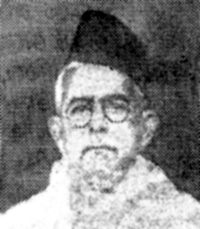Khan, Mohammad Akram

Khan, Mohammad Akram (1868-1968) Journalist, politician, Islamic scholar. Born in village Hakimpur in the district of 24 Parganas of West Bengal in 1868. Maulana Mohammad Akram Khan did not have much formal education. But the depth of his knowledge and learning was impressive. He knowledge in Islamic lore and in the history and culture of the Muslims of Bengal and of India had been very deep.
Mohammad Akram Khan entered professional life very early as a journalist and worked first with the Ahl-i-Hadith and with the Mohammadi Akhbar. Akram Khan worked between 1908 and 1921 as editor of the Mohammadi and the Al-Eslam. He then published the Zamana and the Sebak from Calcutta between 1920 and 1922. Sebak supported the Non-cooperation and the Swadeshi Movements. Sebak was banned and Akram Khan was arrested for his anti-government editorials.
In October 1936, he published the Azad, the only Bengali daily of that time which contributed greatly to generating public opinion in support of the muslim league in the pre-1947 days in Bengal.
Akram Khan started his political career as a supporter of the indian national congress. His concern was to safeguard the interests and rights of the Muslims of Bengal, though not at the expense of Hindu-Muslim accord. He, therefore, actively participated in the formation of the Muslim League in 1906. From 1918 to1924 he was involved in the Khilafat and Non-cooperation movements under the leadership of Gandhi. He was elected Secretary of the Khilafat Committee at the Conference held at ahsan manzil in Dhaka in 1920, which was attended by other eminent Khilafatist leaders like maulana abul kalam azad (1885-1958), maulana maniruzzaman islamabadi (1875-1950) and Maulana Mujibur Rahman (1873-1924). Akram Khan was given the responsibility to collect funds for the Khilafat in Turkey. He organised mass meetings in different parts of Bengal to propagate the cause of the Khilafat and the Non-cooperation movements during 1920-1923.
As a believer in Hindu-Muslim amity, Akram Khan supported chitta ranjan das's Swaraj Party in Calcutta in 1922, and also the bengal pact in 1923. But due to the communal riots of 1926-1927 and other contemporary political developments Akram Khan lost his faith in Indian nationalist politics and left both the Swaraj Party and Congress. From 1929 to 1935 he was deeply involved in Praja or peasant politics. However, he left peasant politics in 1936 and became an activist of the muslim league. He was a member of the central working committee of the League until 1947. After the partition of India (1947) he opted for East Bengal and settled in Dhaka.
He wrote voluminously. His major works include Samasya O Samadhan, the Mostafa Charit, Amparar Babganubad. His most significant book, Moslem Banglar Samajik Itihas, discusses various aspects of Bengal society such as the influence of Pirism and Sufism and the reasons for the degeneration of the Muslims of Bengal. There he criticised Akbar's Din-i-Ilahi and praised Aurangzeb's conformist orthodoxy and his crusade against the syncretic trend. He died on 18 August 1968. He was buried at the Ahl-i-Hadith mosque at Bangshal in Dhaka. [Rana Razzaq]
